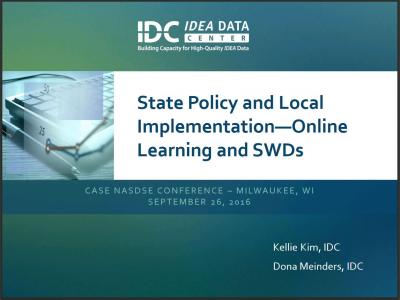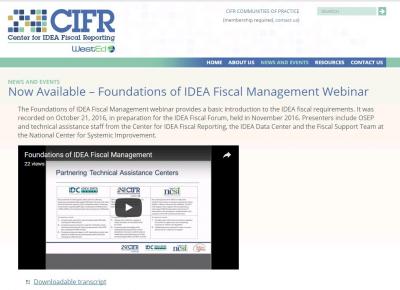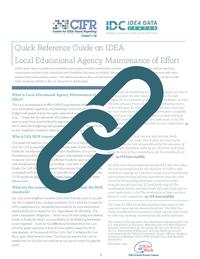Site Search
Results 29 - 35 of 67
Format: Presentations
State Policy and Local Implementation—Online Learning and SWDsFindings from IDC’s white paper and interviews of select states revealed that LEAs are responsible for determining LRE and implementation and monitoring of IEPs in online environments. Presentation of findings were followed by a panel discussion of states and LEAs to discuss key problems of practice and needs for resources that IDC can develop to support greater understanding of implications of online learning for SWDs and the relationship to high-quality data.
Format: Guides, Papers, and Reports
Examining Part C Exiting Data VariationUsing national averages for each of the exiting categories, this white paper helps state personnel examine differences in their Part C Exiting data. The paper explores Part C Exiting data category definitions, as well as general and specific trends in Part C Exiting data. It also includes suggestions for possible strategies to improve data quality, including clarifying policies and definitions, documenting procedures for implementation of policies, and developing training materials related to reporting exiting data.
Format: Recordings
Foundations of IDEA Fiscal Management WebinarThe Foundations of IDEA Fiscal Management Webinar provides a basic introduction to the IDEA fiscal requirements.
Format: Presentations
Equity, Inclusion, and Opportunity: Creating Educational Systems That Meet the Needs of All Groups of StudentsMany schools and districts have been identified as low performing or disproportionate because of disparities between subgroups on a variety of success measures. Other schools and districts are proactively trying to address identified success gaps. Presenters from IDC demonstrated IDC's Success Gaps Toolkit that can help schools and districts 1) prepare all of their students for success in college and careers by addressing success gaps, 2) collect and use quantitative and qualitative data for the purpose of root-cause analysis of those success gaps, and 3) focus attention on those root causes for the benefit of children and students in the lowest performing subgroups.
Format: Presentations
New Significant Disproportionality Regulations WebinarThis webinar focused on key components of the new significant disproportionality regulations presented in §20 U.S.C. 1418(d) and 34 CFR §§300.646 and 300.647. The regulations require states to determine whether significant disproportionality based on race/ethnicity is occurring with respect to the identification of children as children with disabilities, including identification as children with particular impairments; placement of children in particular educational settings; and incidence, duration, and type of disciplinary actions, including suspensions and expulsions. Timeline for state compliance is July 1, 2018, and states must make significant disproportionality determinations using new methodology during SY 2018-19. The webinar highlighted new OSEP Significant Disproportionality Resources and included resources that comprise IDC's Disproportionality and Equity Resource Collection. The webinar was part of IDC's Discipline Peer-to-Peer Exchange.
Format: Reference Materials
Quick Reference Guide on IDEA Local Educational Agency Maintenance of EffortDeveloped by CIFR, in collaboration with IDC, this three-page quick reference guide assists states, LEAs, and stakeholders to better understand the basic local MOE requirements stipulated in IDEA. The guide describes the consequences of failing to meet MOE, standards for calculations, allowable exceptions, and reporting obligations. It concludes with questions and additional resources for states to consider.








